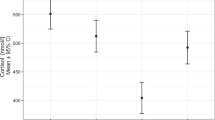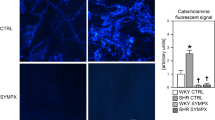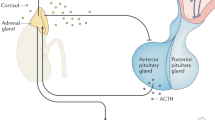Abstract
IT is well known that stress results in increased activity of the adrenal cortex which is caused by an increased secretion of adrenocorticotrophin by the pituitary gland. However, the exact mechanism which controls the secretion of this hormone is not fully understood. Sayers and Sayers1 suggested that stress causes an increased utilization of adrenocortical steroids by the peripheral tissues and the resulting low blood level of corticoids acts as a stimulus to the pituitary gland to increase its secretion of adrenocorticotrophin. The Sayers hypothesis received convincing support from the results of the investigations of Taylor, Albert and Sprague2, Gemzell, Van Dyke, Tobias and Evans3 and Sydnor and Sayers4, who found that animals with adrenocortical insufficiency exhibited a high blood level of adrenocorticotrophin. On the other hand, Barrett and Hodges5 were unable to demonstrate any difference in plasma concentrations of adrenocorticotrophin between normal and adrenalectomized rats three, six and twelve days after the removal of the adrenal glands. The explanation of the discrepancy between these results was difficult to find. However, Barrett and Hodges5 did not use the conventional technique of Sayers, Sayers and Woodbury6 which employs hypophysectomized rats for the bioassay of adrenocorticotrophin, but a modification of the method described by Hodges7 in which normal rats pretreated with deoxycorticosterone acetate were used. The possibility exists that the method was not sensitive enough to detect differences between the plasma-levels of adrenocorticotrophin in the normal and adrenalectomized animals or may even have been completely unsatisfactory for the assay of the hormone in blood. Therefore, it seemed essential to repeat and extend the work using hypophysectomized rats for determination of the adrenocorticotrophin.
This is a preview of subscription content, access via your institution
Access options
Subscribe to this journal
Receive 51 print issues and online access
$199.00 per year
only $3.90 per issue
Buy this article
- Purchase on Springer Link
- Instant access to full article PDF
Prices may be subject to local taxes which are calculated during checkout
Similar content being viewed by others
References
Sayers, G., and Sayers, M. A., Endocrinol., 40, 265 (1947).
Taylor, A. B., Albert, A., and Sprague, R. G., Endocrinol., 45, 335 (1949).
Gemzell, C. A., Van Dyke, D. C., Tobias, C. A., and Evans, H. M., Endocrinol., 49, 325 (1951).
Sydnor, K. L., and Sayers, G., Endocrinol., 55, 621 (1954).
Barrett, A. M., and Hodges, J. R., J. Endocrinol., 13, 394 (1956).
Sayers, G., Sayers, M. A., and Woodbury, L. A., Endocrinol., 42, 379 (1948).
Hodges, J. R., J. Endocrinol., 12, 152 (1955).
Brodish, A., and Long, C. N. H., Endocrinol., 59, 666 (1956).
Author information
Authors and Affiliations
Rights and permissions
About this article
Cite this article
Cox, G., HODGES, J. Adrenocorticotrophic Hormone in the Blood of Adrenalectomized Rats. Nature 181, 420–421 (1958). https://doi.org/10.1038/181420b0
Issue Date:
DOI: https://doi.org/10.1038/181420b0
This article is cited by
Comments
By submitting a comment you agree to abide by our Terms and Community Guidelines. If you find something abusive or that does not comply with our terms or guidelines please flag it as inappropriate.



